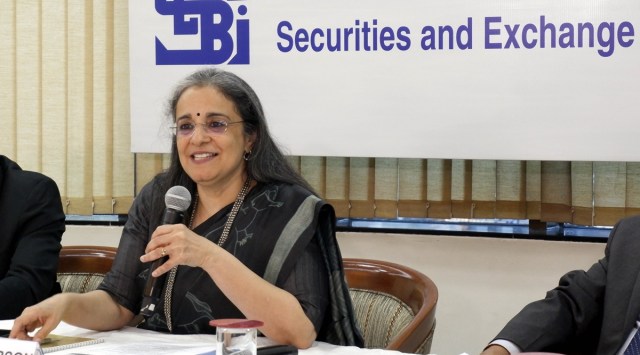© The Indian Express Pvt Ltd
Latest Comment
Post Comment
Read Comments
 SEBI Chairperson Madhabi Puri Buch said, "The idea is that whatever the grey market is going on right now in the pre-listing period, we think that’s not suitable" (Express photo by Pradip Das)
SEBI Chairperson Madhabi Puri Buch said, "The idea is that whatever the grey market is going on right now in the pre-listing period, we think that’s not suitable" (Express photo by Pradip Das)Securities and Exchange Board of India (Sebi) is looking to launch a “when-listed” platform for trading of shares of companies that have finished their initial public offering (IPO) and are yet to be listed on stock exchanges, its Chairperson Madhabi Puri Buch said on Tuesday.
The new platform, when launched, will help reduce trading of shares in the grey market prior to the listing. The regulator is also working with both the exchanges to set up a “when-listed” platform. Buch said
“We are actively considering “when-listed” trading. Today, we are at T+3 (trading plus three
At present, once the IPO is closed, shares have to be listed on bourses in trading plus three working days (T+3), with T being the closing day of the offer. The allotment of shares is done on T+1 day.
She further explained that after the allotment of shares in an IPO, investors have a right to sell those shares. In the period between the allotment of shares and listing day, investors trade in the grey market – an unorganized risky market.
Grey market refers to an unofficial trading of securities even before they are listed on a stock exchange. This is an unregulated market and works on demand and supply. Many investors look at the premium offered in the grey market for stock of a company which has launched an IPO, before considering investing in the offer.
“The idea is that whatever the grey market is going on right now in the pre-listing period, we think that’s not suitable. If you got your allotment (of shares in IPO) and you want to sell it, sell it in the organized market,” Buch said.
According to market participants, by launching the “when-listed” platform, SEBI wants to ensure some amount of pre-IPO activity to happen, but in a legal manner.
The SEBI chairperson further said that the regulator is working on demystifying the IPO document.
“We are at a very advanced stage where there will be a standard template for an IPO. You simply fill it up and it makes your job, as a merchant banker and an issuer, much easier. Anything which doesn’t fit into that normal template, there is a provision for exceptional reporting,” she said.
With this, the IPO document can be read and seen into two parts – standard and exceptional. The new demystified IPO process will reduce the time for merchant bankers to prepare the IPO document and for SEBI to process the application, Buch added.


